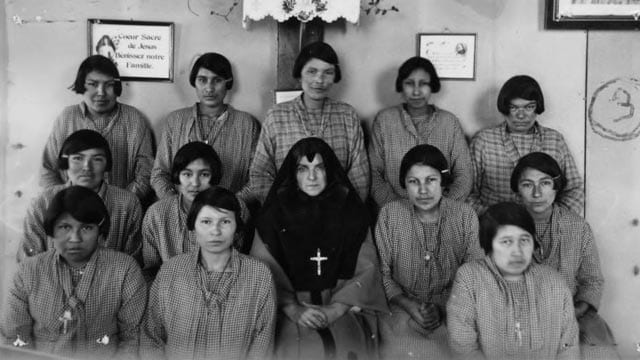
The claims process opens next week for former students forced to attend federal Indian day schools.
Lawyers said in a statement up to 140,000 Indigenous plaintiffs can start submitting claim forms in the Federal Indian Day School class-action settlement on Jan. 13.
Plaintiffs have until July 13, 2022 to complete and submit their forms.
Former students are eligible for compensation of between $10,000 and $200,000, dependind on the abuse they suffered while at the schools.
The lawsuit was initiated by Garry McLean of Manitoba who sued the federal government for $15 billion for abusive treatment and loss of culture on behalf of those students left out of the Indian Residential Schools Settlement Agreement.
Day school students were forced to attend the same schools but permitted to return home evenings because they lived nearby.
The lawyers said more information will be available here by the end of the week.
This settlement represents one of several class-action lawsuits seeking redress from Canada for adults forced to attend residential schools as children.
Curious about the different class actions across the country? Here’s something that might help:
1) Federal Indian Day School (settled, compensation pending)
Under the McLean Class Action, the Federal Court has agreed to compensate up to 140,000 former students for harms suffered at federal Indian day schools and federal day schools. These plaintiffs were excluded from the 2007 Indian Residential Schools Settlement Agreement and prime ministerial apology in 2008.
Compensation for the class is pending.
What do I need to do: Complete a claim form here.
Will I need a lawyer: No. The federal government is covering legal fees provided by Gowling WLG.
Where can I get more information: Federal Indian Day School Class Action
2) Justice for Day Scholars (certified, heading to trial)
The Gottfriedson Class Action applies to thousands of former students forced to attend residential school during the day but allowed to return home at night because they lived close by, their descendants, and more than 100 First Nations seeking reparations for cultural losses. These plaintiffs were also left out of the Indian Residential Schools Settlement Agreement and forced to file a separate lawsuit against Canada.
Where can I get more information: Justice for Day Scholars
3) National Sixties Scoop & Brown v Canada (settled, compensation pending)
The “Sixties Scoop” refers to policies enacted by provincial child welfare authorities between the early 1950s and early 1990s. Under agreements with the federal government, thousands of Indigenous children were taken from their families and placed into the child welfare system.
Compensation for the class is pending.
The class includes two groups of plaintiffs: a) First Nations and Inuit children (permanent ward/foster or adopted) removed from their homes in Canada between January 1, 1951 and December 31, 1991 and placed with non-Indigenous foster or adoptive parents; b) Status Indian children taken from their homes on reserves in Ontario between Dec. 1, 1965 and Dec. 31, 1984, and placed with non-Indigenous foster or adoptive parents who did not raise them in accordance with Indigenous customs, traditions and practices.
What do I need to do: The deadline to join expired Dec. 2, 2019.
Will I need a lawyer: No. Lawyers from four firms that initiated the suit are providing legal services. The firms are Wilson-Christen LLP, Koskie Minsky LLP, Merchant Law Group LLP and Klein Lawyers.
Where can I get more information: Sixties Scoop Settlement
4) Unverified Day School Survivors Society (proposed)
Survivors who attended up to 700 institutions not recognized by other settlement agreements now have their own class-action lawsuit against Canada. Their schools were excluded because they were controlled by the federal government but operated by bands or provinces, were in private residences or hospitals.
What do I need to do: To be determined
Will I need a lawyer: To be determined
Where can I get more information: dayschool.list.com
5) Boarding Home Program for Indian Students (certified)
The federal government removed an estimated 35,000 Indigenous children from their communities in B.C., Alberta and Ontario, and placed them in urban boarding homes to attend municipal schools from the 1950s to the 1980s. A separate law firm is representing plaintiffs from Quebec.
What do I need to do: To be determined
Will I need a lawyer: To be determined
Where can I get more information: Indian Boarding Homes Class Action
6) Kivalliq Hall (added to the Indian Residential Schools Settlement Agreement)
Kivalliq Hall was added in 2019 to the list of eligible schools under the Indian Residential Schools Settlement Agreement to resolve claims of serious sexual, emotional or physical abuse.
Former students who lived at the 40-bed residence while attending high school in Rankin Inlet, Nunavut between June 12, 1985 and December 31, 1997 – and who were alive as of May 30, 2005 – are entitled to the Common Experience Payment and can apply for further compensation through the Independent Assessment Process for any abuse they suffered at the school.
What do I need to do: The deadline to apply is Jan. 25, 2020
Will I need a lawyer: No. Download the application form here.
Where can I get more information: or call the Indian Residential Schools Adjudication Secretariat at 1-877-635-2648.










hello I like to start by introducing myself my name is Gene Ricalton. I am so confused by all these lawsuits going on in Canada right now for day school.as a survivor of a day school in northern Saskatchewan called
ill a-la-crosse.i am wondering where I would be categorized. as I did attend the same school as the village children but went back to this residence at night.what I am wondering is who would I contact about my classification as my home was well over 200 kilometers away.so how could I be classified as a day school or day scholar ???